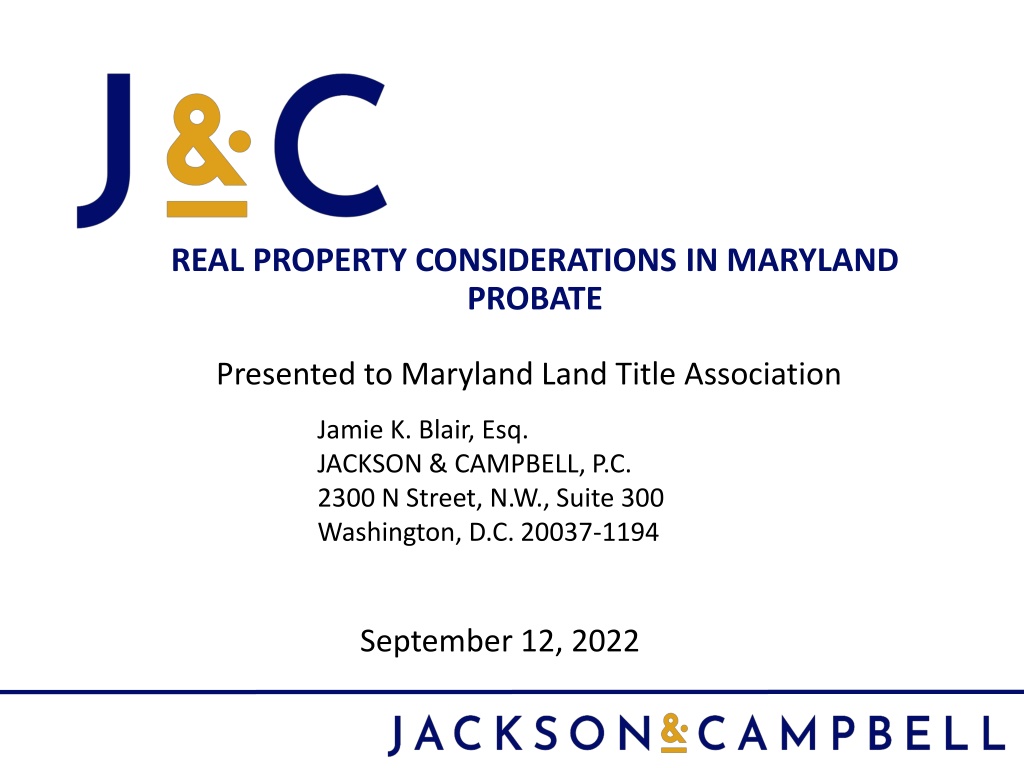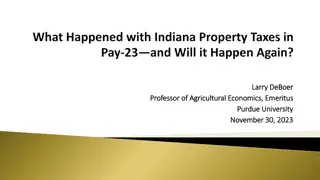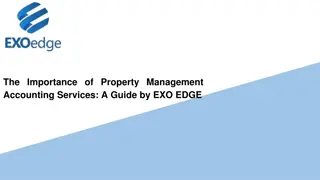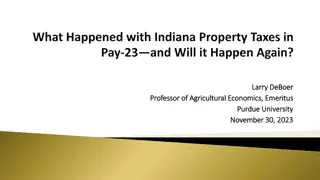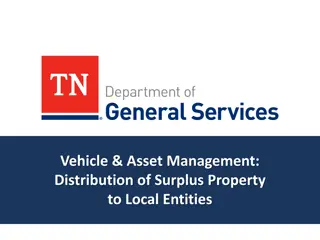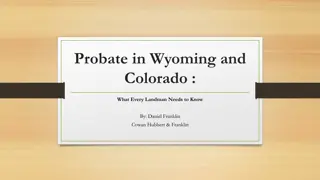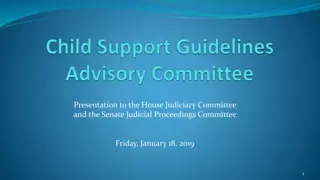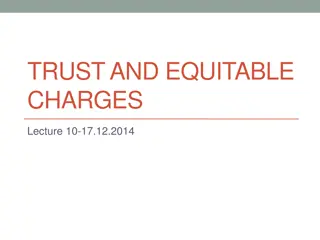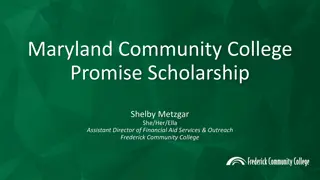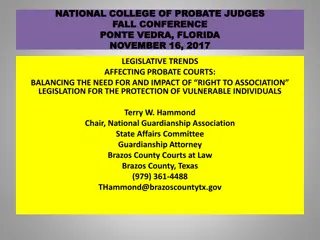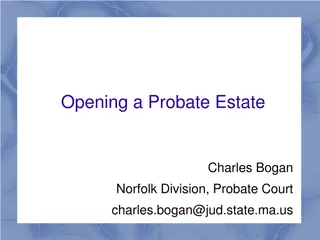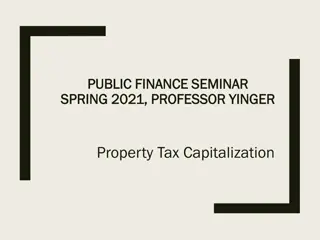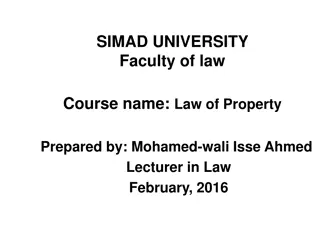Real Property Considerations in Maryland Probate
Understanding the implications of real property ownership in Maryland when an owner passes away is crucial. This includes addressing the need for probate, survivorship tenancy considerations, trust implications, life estate deeds, and the potential need for a Deed of Distribution. The process differs based on various factors, such as the type of tenancy, existence of a trust, or the use of a transfer on death deed. Maryland regulations also outline procedures for probate administration, distinguishing between regular and small estate administration based on estate value.
Download Presentation

Please find below an Image/Link to download the presentation.
The content on the website is provided AS IS for your information and personal use only. It may not be sold, licensed, or shared on other websites without obtaining consent from the author. Download presentation by click this link. If you encounter any issues during the download, it is possible that the publisher has removed the file from their server.
E N D
Presentation Transcript
REAL PROPERTY CONSIDERATIONS IN MARYLAND PROBATE Presented to Maryland Land Title Association Jamie K. Blair, Esq. JACKSON & CAMPBELL, P.C. 2300 N Street, N.W., Suite 300 Washington, D.C. 20037-1194 September 12, 2022
A real property owner has died. What are the next steps? Is probate required? Survivorship Tenancy (tenants in common, joint tenants w/right of survivorship, or tenants by the entirety) Presumption if Maryland that spouses hold title as tenants by the entirety Does not convert to tenancy by the entirety if purchased prior to marriage Divorce coverts to tenancy in common Contrast with DC marriage does not create presumption of tenancy by the entirety New deed for surviving joint tenant or tenant by the entirety? Property held in trust (confirm trust remains in existence) Deed of Distribution Required
A real property owner has died. What are the next steps? Is probate required? (cont.) Life Estate Deed Sometimes referred to as Lady Bird Deed. Identify remainderman/men, survivorship requirements, and resulting tenancy. Need deed? Record death certificate (w/o SSN)? With or without powers? Transfer on Death Deed Created in 2015. Not recognized in MD (but permitted in DC and VA). Bill is before MD legislature (not the first time). Beneficiaries creditors cannot reach the property.
A real property owner has died. What are the next steps? Is probate required? (cont.) If none of the above apply, probate is required. Title vests immediately in Personal Representative. Compare to VA (property descends by operation of law) and DC (vest immediately in Personal Representative for decedents passing after 1/1/1981). MD Code 1 301 All property of a decedent shall be subject to the estates of decedents law, and upon the person's death shall pass directly to the personal representative, who shall hold the legal title for administration and distribution, without any distinction, preference, or priority as between real and personal property.
A real property owner has died. What are the next steps? What are the different types of probate administration? Regular vs. Small Estate Based on the value of the gross estate. Small Estate available if property is valued at $50,000 or less, or $100,000 of less if the surviving spouse is sole legatee. MD Code 5 601. Not subject to creditor s claims of Inheritance Tax. No attorney/Personal Representative compensation permitted. Must provide proof of valuation (e.g. bank statements). Does not need to be exact DOD valuation. No ongoing filing requirements. Opens and closes administratively same day.
A real property owner has died. What are the next steps? What are the different types of probate administration? (cont.) Modified Administration For persons dying on of after October 1, 1997. Must be elected three months after date of appointment. Usually elected at the time original petition is filed. 4 Conditions must be met (MD Code 5 702): All residuary legatees or heirs are exempt from inheritance tax or are the Personal Representative. Taxable specific bequests are permitted. Estate is solvent and sufficient assets to satisfy testamentary gifts. Final Report filed within 10 months of date of appointment. Relaxed accounting requirement. No inventory required. Distribution occurs 12 months after date of appointment. All interested parties execute consents. Consent by parent or attorney-in-fact not permitted.
A real property owner has died. What are the next steps? What are the different types of probate administration? (cont.) Judicial vs. Administrative Administrative (overseen by Register of Wills) Vast majority of estates Judicial (overseen by Orphan s Court) Typical Scenarios Contested Will Destroyed or Mutilated Will Lost Will (when not all interested persons file consents) Petitioner lacks priority to serve (see MD Code 5 104)
A real property owner has died. What are the next steps? Is Bond Required? Bond is required with surety approved by Register unless excused by decedent s Last Will and Testament or all interested persons sign written waiver. MD Code 6 102. Even if Will waives bond, it may still be required if Inheritance Tax is due. Only needed to cover estimated tax not total gross estate. Co-Personal Representatives jointly and severally liable. Corporate fiduciaries are exempt. Attorneys are not.
How are creditor claims handled in Maryland? Time Period for Filing Claim Regular/Modified Administration 6 months from date of death Not tied to date of appointment or publication of notice of appointment (still required) Small Estate no claims permitted Can shorten SOL by mailing known creditors notice that claim must be filed within two months of receipt. Assets held in Revocable Trust Do not enjoy shortened SOL unless notice is published similar to that required for regular estates. SOL does not apply to claims of State of US Government. Medical Assistance (Medicaid) claims run from 6 months after publication of last notice
How are creditor claims handled in Maryland? Time Period for Filing Claim (cont.) Federal Claims Subject to Federal SOL (not state law) Have first priority under 31 U.S.C. 3713 (a)(1)(B). a claim of the United States Government shall be paid first when the estate of a deceased debtor, in the custody of the executor or administrator, is not enough to pay all debts of the debtor. Some carve outs under case law for funeral and estate administrative expenses. Secured Creditors Not required to file claims and maintain rights under security agreement. MD Code 8-111.
How are creditor claims handled in Maryland? Untimely Claims? May be permitted is Personal Representative had knowledge of creditor and failed to provide actual notice (i.e. publication not sufficient). Knowledge of Claim Reasonably ascertainable?
How are creditor claims handled in Maryland? Priority of unsecured claims is governed by MD Code 8-105. (1) Fees due to the register; (2) Costs and expenses of administration; (3) Funeral expenses as provided in 8-106 of this subtitle; (4) Compensation of personal representatives as provided in 7-601 of this article, for legal services as provided in 7-602 of this article, and commissions of licensed real estate brokers; (5) Family allowance as provided in 3-201 of this article; (6) Taxes due by the decedent; (7) Reasonable medical, hospital, and nursing expenses of the last illness of the decedent; (8) Rent payable by the decedent for not more than three months in arrears; (9) Wages, salaries, or commission for services performed for the decedent within three months prior to death of the decedent; (10) Assistance paid under the Public Assistance to Adults Program, as provided in 5- 407(d) of the Human Services Article; and (11) All other claims.
How are creditor claims handled in Maryland? Upon presentation of a claim, the Personal Representative may mail a notice to the claimant stating that: The claim has been allowed in the claimed amount; The claim has been disallowed in whole or in part and advising the claimant of the procedures and time limitations for contesting such disallowance (60 days from notice); or The Personal Representative will petition the court for a determination on paying the debt. MD Code 8-107(a). A creditor that previously presented a valid claim or has a valid judgment that has not been paid after expiration of claim period may petition the court for an order directing the Personal Representative to pay the claim to the extent that funds of the estate are available for such payment. MD Code 8-108(a). Consider how to handle Personal Representative who is a creditor.
How are creditor claims handled in Maryland? Liability of Personal Representative Personal Representative has same liability as agent for a disclosed principal. Not personally liable on estate contracts unless Personal Representative expressly agrees. Triggered when a Personal Representative transfers assets with notice or knowledge of claim.
The estate is open. When can the property be sold/transferred? Real property can be sold without Court Order or notice to interested persons. MD Code 7-401(n). Personal Representative who seeks to sell real property that has been specifically devised in Last Will and Testament should always seek court approval or consent of all interested persons. If bond was reduced by value of any real estate that cannot be sold without prior Court Order, Personal Representative needs to obtain a Court Order rescinding this restriction. Sale Prior to Claims Period? Permissible but sales proceeds should not be distributed. Attachment Claims do NOT attach to real property. An execution or a levy may not issue nor be made against property of the estate under a judgment against a decedent or a personal representative. MD Code 8-114(a). Does not apply to secured claims. MD Code 8-114(b).
The estate is open. When can the property be sold/transferred? What if the Personal Representative is unavailable? Can he/she delegate or execute a power of attorney? No PR acts in a fiduciary capacity and cannot delegate unless specifically authorized to do so pursuant to Court Order. Applies to Co-Personal Representatives as well.
The estate is closed. What can the Personal Representative do if anything? Approval of final account terminates the estate. MD Code 10-101(a). Confirmatory Acts Nothing in this subtitle affects the authority of a personal representative to perform ministerial or confirmatory acts after an estate is closed or the appointment of the personal representative is terminated. MD Code 10-105. Deed of distribution to heirs/legatees is generally considered a ministerial act. Does not apply to newly discovered property. Estate must be reopened and additional fees will apply. If property must be sold, estate will need to be re-opened. Re-opening estate does not subject estate to second creditor claim period. MD Code 10-104(b).
Certain real property was not properly transferred. Owner is deceased. Now what? Start with a family tree and by ascertaining the date of death of all persons with a real property interest and determine domicile and whether estate have been opened. Two Options Open estates for decedents with property interests. Small Estate or Modified Administration? File a quiet title action. Are persons with priority to serve available? If not, petitioner must go through judicial probate.
What if decedent did not reside in Maryland? Most jurisdictions require ancillary/foreign estate. MD permits ancillary estate but also has a simpler process: Application to Fix Inheritance Tax Any Inheritance Tax must be paid. Will must authorize Personal Representative to execute Deed of Distribution. No ongoing filing requirements. No bond requirements. Contrast to DC (bond required to sell real property outside of claim period with premiums up to 4X regular rate) Letters of Administration will not be issued. MD Code 5-501. When recording deed, send original Letters of Administration from domicile, as well as probate pleadings and a copy of the Last Will and Testament.
What if decedent did not reside in Maryland? What if no estate was opened in decedent s domicile? Was probate required in domicile (but not initiated)? Court generally will not exercise original jurisdiction over the estate of a decedent who was not domiciled in MD at the time of his or her death. One exception is where all of the decedent s property is located in the MD, and probate proceedings in the jurisdiction of his or her domicile are unnecessary.
Will there be transfer and recordation taxes? Transfer Tax - 0.5% of the consideration payable, including the amount of any mortgage or deed of trust assumed by grantee. Note that county transfer taxes ranging from 0% to 1.5% could also apply. MD Code 13 203. Recordation Tax: Varies county by county where the instrument is recorded.
Will there be transfer and recordation taxes? Exemptions MD Code 12-108 and 13 207 provides certain exemptions from property tax. 12-108(dd)/ 13 207(a)(22) Transfer of real property of an estate. Property assigned by heir/legatee may be subject to tax. 12-108(dd)/ 13 207(a)(23) Transfer of real property to or from a trust. Only applies if there is no consideration. Applicable to testamentary trusts contrast DC.
What are the implications for a taxable estate? Both Federal and MD Estate Taxes are automatic liens against all real property of the estate (no recording required), and proof of payment or other adequate insurance must be provided, including: Escrow all proceeds from the sale, pending proof of payment (e.g. closing letter or discharge of lien) or payment of applicable taxes from escrow.
What are the implications for a taxable estate? Closing Letters Provided by IRS and MD Comptroller when estate tax return has been reviewed and approved COVID-19 pandemic has significantly delayed issuance (but slowly improving). Discharge of Federal Estate Tax Lien File Form 4222, Application for Certificate Discharging Property Subject to Estate Tax Lien. Discharge of lien does not necessarily mean estate tax is paid in full (e.g. lien may be discharged if, on a conservative estimate, the fair market value of the property not discharged is at least double the amount of the tax liability plus all prior liens). If accepted by the IRS, the taxpayer will receive Letter 403, Conditional Commitment, followed by Form 669, Certificate of Discharge. Typically, 2 week turnaround. Net proceeds of the sale must be deposited in escrow or with IRS, and the IRS will release the net proceeds (less any amount used to pay federal estate tax due) after an estate tax closing letter is issued. 4. Tax lien will still be in effect on the taxpayer s remaining property.
What are the implications for a taxable estate? Discharge of Maryland Estate Tax Lien No procedure available by Comptroller, which operates much more informally. May be required to escrow proceeds pending closing letter. Non-Taxable Estate Seek indemnity from Personal Representative. Require satisfactory proof that estate assets do not exceed federal and MD estate tax thresholds. e.g. Final approved account in probate (BUT this will not cover non-probate assets also subject to estate tax).
What are the implications for a taxable estate? MD Estate Tax Estate Tax Exemption - $5M per person (for decedents dying after 12/31/2011). Not currently adjusted annually for inflation unlike Federal Exemption. Due 9 months after date of death. Rate - Graduated rates from 8% to 16% based on size of estate. Portability recognized as of 2019. Spouses have the option to take survivor s unused exemption effectively making combined exemption $10M for married couples. Must be timely elected on Form MET-1, Estate Tax Return. Estate Tax for Non-Domiciliary Non-resident of MD must file if entire gross estate exceeds $5 million i.e. includes all property, not just property located in MD. Tax is calculated by determining tax rate as if all estate assets were located in MD and multiplying tax by percentage of property actually located in MD meaning MD estate tax may be due even if value of MD real estate is under $5 million.
What are the implications for a taxable estate? MD Inheritance Tax Imposed on the "privilege of receiving property that passes from a decedent and has a taxable situs" in Maryland. No threshold amount except that probate property subject to small estate is not taxed, nor are distributions of less than $1,000 to specific person. Applies to non-residents. Applies to non-probate property. Rate of 10% of clear value (fair market value minus expenses). Certain recipients are exempt (e.g., spouse, descendant, parent, grandparent, sibling, corporation/partnership/LLC, if all of its stockholders/partners/ members are exempt persons, non profit organization). Dollar for dollar credit on MD Estate Tax Return. Will also create a tax lien.
What are the implications for a taxable estate? Federal Estate Tax Current exemption is $12.06 million with portability and taxed at a rate of 40%. Consider Gift Tax and Generation Skipping Tax Upcoming Changes? Estate tax changes in the Tax Cuts and Jobs Act are currently scheduled to sunset after 2025, unless Congress takes further action. Other changes? Drop in exemption? Elimination of step up in basis? Rate increase?
THANK YOU! Questions or Comments (welcome anytime): Jamie K. Blair, Esq. jblair@jackscamp.com (202) 457-1629 (direct)
